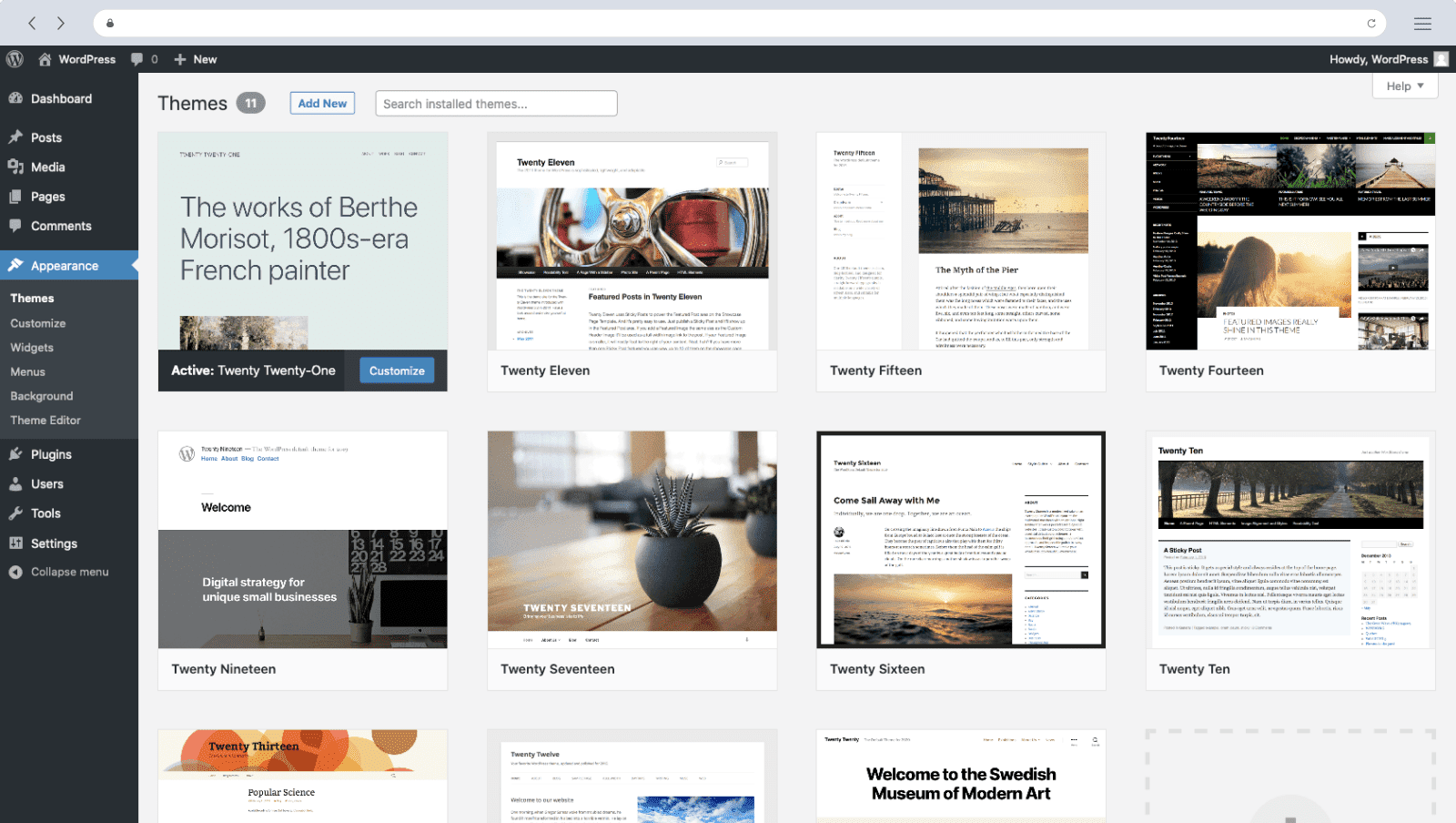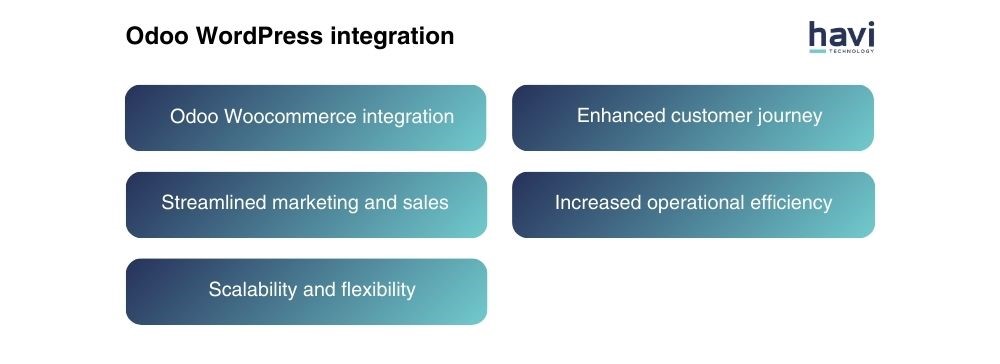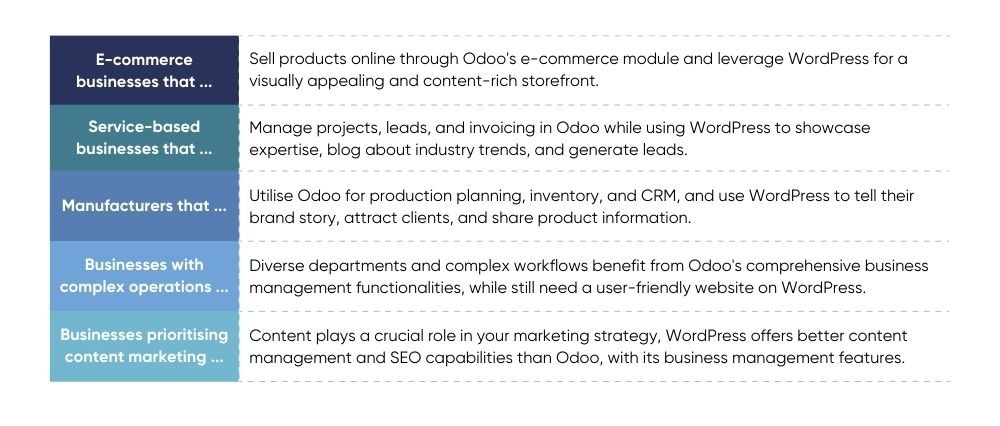Considering the integration of Odoo and WordPress for your business operations? This guide delves into the significant potential of combining these two powerful platforms. We will walk you through the decision-making process, outlining the advantages, and exploring the common integration methods available in the market.

Understanding the Foundations: Odoo and WordPress
Odoo
Odoo stands as one of the most widely adopted Enterprise Resource Planning (ERP) systems available today. Its comprehensive, open-source suite of business modules is meticulously designed to enhance virtually every facet of a company's operations. The vibrant Odoo developer community ensures continuous development and robust support, while its open-source nature prioritizes cost-effectiveness and extensive customization opportunities. Key features of Odoo encompass essential business management areas such as Sales and CRM, Inventory and Manufacturing Resource Planning (MRP), Finance and Accounting, Marketing and E-commerce, Project and Human Resources management, alongside numerous other specialised applications.

WordPress
WordPress is a renowned open-source and free content management system (CMS) that provides the framework for creating and managing a vast array of blogs and websites. Powering over 800 million websites globally, WordPress has solidified its position as the most popular CMS worldwide. It offers a suite of robust commercial features, including extensive website function extensibility through plugins, powerful marketing and monetization tools, intuitive website design and management capabilities, and various services aimed at improving website performance.

Key Benefits of Odoo and WordPress Integration

Seamless WooCommerce Integration
WooCommerce, a widely used and free WordPress plugin, offers robust e-commerce capabilities. Integrating Odoo with WooCommerce creates a unified ecosystem where you can manage your entire online business from a single source of truth. This includes marketing efforts, comprehensive customer support, streamlined operations, financial management, efficient order processing, and precise inventory control. The combination of Odoo and WooCommerce enables features like automatic inventory updates, simplified order fulfillment, and centralized sales tax and shipping calculations, all designed to ease your business operations and accelerate your path to sustained success in e-commerce.
Enhanced Scalability and Flexibility
Both Odoo and WordPress are designed with scalability and flexibility at their core, ensuring that your digital infrastructure can expand effortlessly alongside your growing business. Odoo’s modular architecture provides an extensive array of modules to cater to diverse company requirements, allowing you to seamlessly add functionalities as your needs evolve. Its user-based licensing model means you only pay for the number of active users, who can then access any modules they require. Similarly, WordPress allows for deep customization of your website through a vast selection of plugins, ranging from e-commerce solutions to sophisticated lead capture forms, adapting to your changing demands. Crucially, its open API facilitates seamless integration with a wide variety of tools and applications, including Odoo. This inherent flexibility not only reduces the burden of unnecessary features but also ensures your website remains adaptive, thereby optimizing resource utilization and overall performance.
Enriched Customer Journey
The integration of these platforms significantly enhances the customer journey. Customers can effortlessly browse products on your WordPress website, transition smoothly to placing orders within Odoo, and manage their purchases with ease. This integration effectively eliminates data silos, providing a more cohesive and unified customer experience that ultimately boosts satisfaction and fosters loyalty. Odoo’s robust capabilities in order processing and account administration ensure efficient fulfillment and transparent communication throughout the customer lifecycle. Imagine a scenario where a customer discovers a product on your WordPress site and then experiences an effortless in-store checkout using Odoo POS. This seamless connection between your online and offline worlds is precisely the comprehensive advantage offered by this powerful integration.
Streamlined Marketing and Sales
Integrating Odoo and WordPress allows for a strategic improvement in lead nurturing and customer engagement. You can capture leads directly from your WordPress website and automatically merge them into Odoo's Customer Relationship Management (CRM) system. Furthermore, with a unified view of the customer experience, your teams can dismantle departmental silos, fostering seamless collaboration across both marketing and sales functions. This powerful combination significantly broadens your market reach, efficiently develops potential leads, and converts them into loyal, long-term customers.
Increased Operational Efficiency
The integration of Odoo and WordPress contributes substantially to increased operational efficiency by automating repetitive tasks. This includes processes such as lead generation, order management, and even complex e-supply chain operations like inventory and warehouse management. By automating these tasks, significant time and resources are freed up, allowing your team to focus on strategic goals and cultivating stronger customer relationships. Odoo’s advanced automation capabilities streamline internal operations, while WordPress’s content scheduling features can automate content posting, helping to reduce manual errors and ensure consistent online presence.
Exploring Common Integration Approaches
Selecting the most suitable integration option for Odoo and WordPress necessitates a thorough analysis of your specific business requirements and technical capabilities. Here are four common methods for achieving this integration:

Direct API Integration
Leveraging the native Application Programming Interfaces (APIs) of both Odoo and WordPress allows for the development of a custom integration tailored precisely to your unique specifications. This method offers the highest degree of flexibility and control over the integration process, making it ideal for businesses with complex operational workflows or highly specific integration demands. However, it typically requires a considerable level of technical expertise and dedicated development resources for successful implementation and ongoing maintenance.
Odoo/WordPress Plugins and Connectors
Plugins and connectors represent ready-made solutions designed to address common Odoo and WordPress integration needs, such as product data synchronization, lead capture mechanisms, and user authentication. Several common options are available:
- Odoo Connector: This type of plugin typically facilitates basic synchronization for essential tasks like product data, lead information, and order details. It is generally straightforward to set up, but it may offer limited custom functionality for more intricate integration scenarios.
- WordPress Connector: Such plugins often provide more advanced functionality, including real-time synchronization, automated workflows, and robust two-way data exchange. While it might demand slightly more technical understanding to configure, it can prove highly effective for managing complex integrations.
- Third-party Plugins: A variety of developers offer specialized plugins with unique functionalities, such as combining specific Odoo modules (e.g., Odoo CRM with WordPress forms) or customizing particular aspects of the integration process. While these can offer significant flexibility, they may also necessitate continuous maintenance and compatibility testing to ensure smooth operation.
Third-Party Integration Tools
Platforms like Zapier provide intuitive visual drag-and-drop interfaces that are particularly well-suited for users without extensive technical backgrounds. These tools facilitate connections between various applications through pre-built "zaps" or "flows." While offering ease of use and rapid deployment, third-party tools might present certain limitations when compared to fully customized integration solutions, especially for highly specific or complex requirements.
Professional Integration Services
Many specialized companies offer dedicated integration services for Odoo and WordPress, including WooCommerce. These experts manage the entire integration process, encompassing setup, configuration, and ongoing maintenance, thereby ensuring a smooth and efficient experience. This solution is particularly advantageous for businesses that may lack the internal technical resources or expertise required to conduct the integration themselves, providing a hassle-free approach, albeit at an additional investment.
Critical Considerations: Do You Need Both Platforms?
Understanding the context and implications is crucial. While integrating open-source platforms like Odoo and WordPress can significantly boost your business capabilities, it is a decision that warrants careful evaluation. Here is a practical roadmap to guide you through the selection process before committing to an integration strategy.
Know Your Needs
Before embarking on an Odoo and WordPress integration, it is essential to thoroughly assess your company's current operational landscape. Consider the following pivotal aspects:
- Your Current Pain Points: Are you struggling with fragmented data, inefficient workflows, or a suboptimal online customer experience? Identifying these challenges will clearly illustrate how a thoughtful integration can provide meaningful solutions.
- Your Business Goals: Are your primary objectives to increase online sales, strengthen customer relationships, or fundamentally streamline internal operations? Aligning any integration efforts with your overarching business goals ensures that the initiative yields tangible and valuable outcomes.
- Your Existing Systems: What other software solutions are currently in use for marketing, accounting, or other critical functions? Determining potential compatibility and identifying any integration complexities with these existing systems is a vital preparatory step.
To help visualize this more clearly, here’s a breakdown of typical scenarios:
Examples of businesses that benefit from both platforms:

And those who might be better off with one platform first:

Ultimately, the final decision hinges on your specific business strategy, overarching goals, and available resources. It is imperative to meticulously consider your needs, budget allocations, and technological capabilities before concluding whether to implement both platforms.
Weigh the Pros and Cons
While the potential advantages of integrating Odoo and WordPress are evident, a well-informed strategy demands a balanced assessment of both the benefits and potential drawbacks. We have compiled a list of common benefits and constraints to aid your evaluation:

Consider Your Resources
A meticulous evaluation of your available resources is paramount for a successful integration. This step ensures that the project is not only feasible but also can be effectively implemented and sustainably maintained. Key aspects to consider include:
- Technical Expertise: Do you possess the internal capabilities to handle basic troubleshooting and configuration, or will professional assistance be required for setup and ongoing support?
- Budget: Can your financial plan comfortably accommodate the associated integration costs, which may include investments in tools, developer fees, or recurring application subscriptions?
- Time Commitment: Are you prepared to allocate dedicated time for understanding, implementing, and managing the integration to ensure its optimal performance?
Explore Alternatives
Before committing to a potentially complex integration procedure, it is crucial to thoroughly explore all available options. The objective is always to identify the most efficient and cost-effective solution that aligns perfectly with your specific business objectives and resource constraints. Consider the following questions:
- Can your objectives be met by simply enhancing or optimizing your current systems? Sometimes, strategic updates to your existing Odoo or WordPress installations might be sufficient.
- Are there simpler, less complicated integration options that specifically cater to your immediate requirements? Investigate user-friendly plugins or third-party utilities that offer more straightforward solutions.
Seek Information and Support
While the integration of Odoo and WordPress holds transformative potential, it also necessitates a commitment to continuous learning and ongoing support. Fortunately, you are not alone in this endeavor. A wealth of resources and collaborative networks are available to empower your journey:
- Engage with Other Businesses: Connect with companies that have successfully integrated Odoo and WordPress to gain valuable insights from their firsthand experiences and learned best practices.
- Consult Online Resources: Actively access and utilize dedicated forums, active communities, and informative blog posts to gather diverse perspectives, gain deeper insights, and find practical assistance.
- Consider Professional Help: When necessary, seek expert advice from experienced developers or integration specialists. Their customized guidance can be invaluable in navigating complex aspects of the integration and ensuring a robust solution.
Finally, it is important to remember that while connecting Odoo and WordPress can lead to significant improvements in efficiency and customer experience, it is not a universally applicable solution. We recommend starting with a smaller scope and gradually expanding. Begin by incorporating basic functionalities and then extend as you gain confidence and familiarity. Always keep your core business objectives in mind and continuously evaluate how the integration contributes to achieving those goals.
Making an Informed Decision: Seeking Expert Guidance
Combining the robust capabilities of Odoo and WordPress is akin to orchestrating a strategic growth plan for your business. From simplifying daily operations to fostering enhanced stakeholder interaction, the opportunities presented by such an integration are undeniable. However, navigating the inherent technological complexities can indeed be challenging.
To ensure a seamless and truly impactful integration, it is highly advisable to consider collaborating with an experienced Odoo or WordPress integration service provider. Their specialized expertise ensures a successful deployment that is perfectly tailored to your unique requirements, allowing your team to focus on optimizing the numerous benefits derived from this powerful combination. Do not allow potential technological hurdles to prevent this dynamic pairing from reaching its full potential; instead, embrace expert guidance to unlock its complete value.




